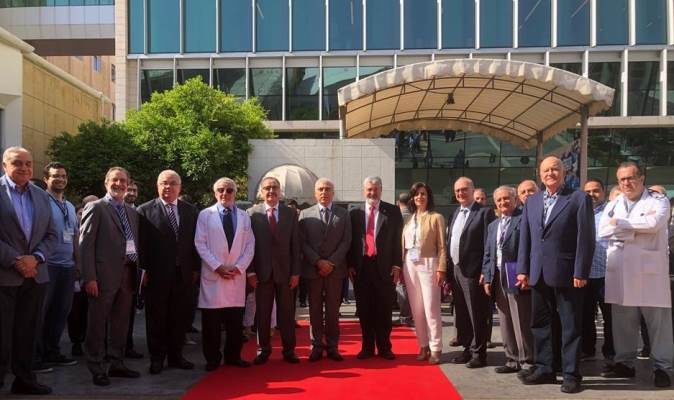The American University of Beirut Medical Center (AUBMC) hosted the 50th edition of the Middle East Medical Assembly (MEMA) titled: “The Perioperative Multidisciplinary Care of the High Risk Surgical Patient: Stepping outside the Comfort Zone”. The assembly held on May 2 – 4 was organized in partnership with the International Committee of the Red Cross (ICRC) and in joint providership with Cleveland Clinic.
The conference was launched in an opening ceremony at Issam Fares Lecture Hall in the presence of Dr. Fadlo Khuri, President of the American University of Beirut, Dr. Mohamed H. Sayegh, Executive Vice President for Medicine and Global Strategy, Raja N. Khuri Dean of the Faculty of Medicine, Dr. Jamal Jawad Hoballah, Chairperson of the Department of Surgery and Chairperson of the 50th MEMA, Dr. Marie Maroun Aouad, Chairperson of the Department of Anesthesia and Chairperson of the MEMA Scientific Committee along with members of the AUB community, faculty, and staff.
Over the years, MEMA has evolved to maintain its position as a landmark of the scientific conferences in the region. Tapping into the perioperative care of the high risk surgical patients, this year’s program covers significant topics including cardiac risk assessment and scoring systems, perioperative infections and antimicrobial management, renal risk reduction, perioperative endocrine dilemmas, ECMO, operating rooms crisis management and anesthesia dilemmas, frailty, high risk surgical procedures in neurosurgery, bariatric surgery, hepato-biliary surgery, cardiac and thoracic surgery, vascular surgery, trauma, urology, plastic, and orthopedic surgery along with challenging dilemmas in caring for the pediatric patient and advances in intra and postoperative monitoring.
“This year’s exciting theme of perioperative care for high-risk surgical patients is obviously of great interest to a wide variety of disciplines, as evidenced by the impressive line-up of national and international speakers from the US, Europe, and the region,” said Dr. Jamal Jawad Hoballah. “Across a span of three days, keynote speakers will address a plethora of topics covering the full spectrum of preoperative, intraoperative, and postoperative management of high-risk surgical patients. These exciting topics will be supplemented by several hands-on workshops.”
Complementing the AUBMC 2020 Vision, MEMA 2019 will feature several workshops conducted by specialized clinicians presenting practical information based on current best evidence and content-expert experience of leading clinicians in various topics. It also provides a full range of preoperative, intraoperative, and postoperative management of high-risk surgical patients to guarantee advanced long-term care while delivering the best results based on new hybrid techniques and cutting-edge technologies. The scientific gathering will also shed light on the current practice of perioperative and critical care medicine which is characterized by high-risk elderly patients and disorders co-occurring out of an ever-growing spectrum of surgical interventions in and out of the operating rooms.
“The subtheme of this conference – Stepping outside the comfort zone – is of the utmost importance, not only in medical education but in all fields. If we don’t push the boundaries, question assumptions, and critically analyze our methods then we will never advance beyond our current knowledge,” said Dr. Marie Maroun Aouad. “We have made extraordinary advancements in the past century in terms of surgical methods and outcomes, but we know that there is always a room for improvement. The fact that such improvements may mean a human being is allowed more time to spend with their loved ones and fulfill their dreams is an incredible motivating factor.”
The perioperative care consists of guiding the multidisciplinary team involved to optimize the chances for better informed decisions based on medical specialists’ referrals before surgery, after specialized preoperative investigations and preoperative initiatives aimed at reducing perioperative risk and ensuring appropriate levels of postoperative care.


